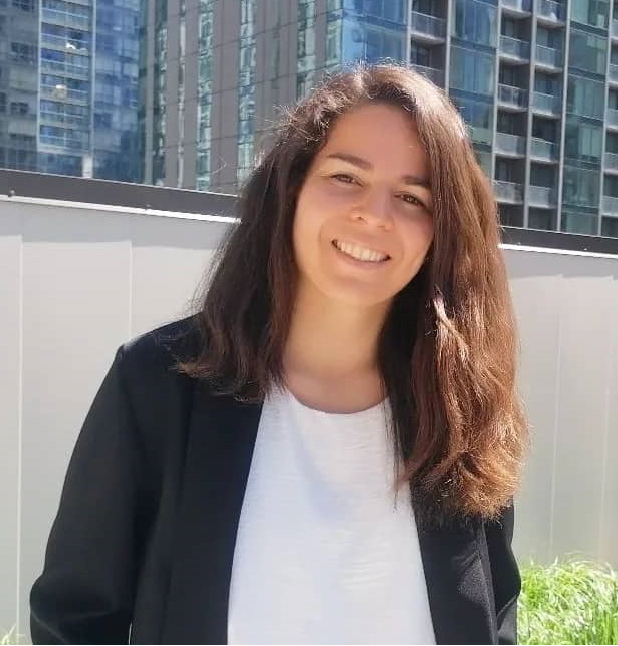Need Help?
14 March 2024
Interview with Ms. Ana Isabel Carreiro Furtado—Winner of the Materials 2024 Travel Award

We congratulate Ms. Ana Isabel Carreiro Furtado on winning the Materials 2024 Travel Award. Ms. Furtado is a Ph.D. student at NOVA School of Science and Technology, NOVA University of Lisbon, Portugal. Her research is focused on the development of high-affinity polymers for biomolecule recognition using green strategies.
The following is an interview with Ms. Ana Isabel Carreiro Furtado:
1. Can you briefly introduce yourself to our readers and tell us a little bit about your fields of interest?
I am a young researcher in sustainable chemistry, specializing in the development of hybrid materials for catalysis and biopurification. I have a master's degree in chemical and biochemical engineering, and I am currently in the final year of my Ph.D., conducting research in collaboration with the CleanMIPTech Group at the Associated Laboratory for Green Chemistry (LAQV) at Nova School of Science and Technologies (NOVA SST), the Institute for Bioengineering and Biosciences (iBB), and the Institute for Health and Bioeconomy (i4HB) at Instituto Superior Técnico, University of Lisbon (IST/UL), in Portugal. The main focus of my Ph.D. is the development of green, high-affinity, and cost-effective biorecognition polymeric materials, such as molecularly imprinted polymers (MIPs) and dendrimers, for biomolecules. These innovative materials are synthesized using sustainable technologies to address the limitations associated with conventional biopurification materials, including high costs, low efficiency, limited specificity, and scalability challenges. My research interests lie at the intersection of green chemistry, materials science, and engineering, particularly in developing new devices for biopurification. I am particularly interested in utilizing green technologies such as supercritical carbon dioxide and mechanochemistry to synthesize functional polymeric materials with applications in biosensors and separation devices. Additionally, I am exploring molecular imprinting techniques and computational modeling as a multidisciplinary approach to design and characterize these affinity materials.
2. How did winning this award impact your career, and what do you hope to do?
Winning the Materials 2024 Travel Award had a significant impact on my career by providing me with the opportunity to present my latest research findings on sustainable technologies and their contribution to the design of affinity materials. This will be achieved through my participation in the 12th International Conference on Molecular Imprinting (MIP2024), where I will deliver an oral presentation on “Metal-based Molecularly Imprinted Polymer Development toward L-Leucine using Supercritical CO2 technology for Bio-applications: Rational design using Molecular Dynamics”. This conference, focusing on molecular modeling of MIP systems, synthesis and characterizations of imprinted materials, and their applications in bio-devices such as sensing devices, separation processes, and catalysis, perfectly aligns with the goals of my Ph.D. work. Attending MIP2024 will not only provid me with an opportunity to show my work but will also allow me to engage with international experts in the field. This networking opportunity will be crucial as I am in the final stages of my Ph.D. and seeking collaborations. These connections and partnerships could potentially shape my future professional career.
3. During the conference, will you pay attention to promoting the journal during the presentation of the participants?
Yes, absolutely! As a driven researcher with a keen interest in leveraging chemistry, material science, and technology for sustainable solutions, I am deeply aligned with the goals of the Materials. Therefore, I will pay attention to promoting the journal during my presentation at the conference. Supporting and promoting avenues that facilitate the dissemination of research in these fields is essential for advancing knowledge and fostering collaboration toward future material development.
4. What qualities do you think young scientists need?
In my opinion and according to my experience, young scientists need resilience, as science often involves encountering failure and setbacks. The ability to learn from mistakes and persist in facing challenges is essential. Critical thinking skills are also essential to analyze information rigorously and conduct high-quality research, as well as good management planning to carry out tasks and consider if investing time in a given project is valuable. Thirdly, courage is necessary for young scientists to share their ideas with the scientific community and seek researchers who can help and contribute with new knowledge. Therefore, communication skills are also crucial for sharing research findings with both peers and the wider audience. Finally, young scientists should possess a willingness to embrace new opportunities, projects, and collaborations, be open to teamwork, and improve their interdisciplinary skills.
I am deeply honored and grateful for this recognition. I extend my heartfelt thanks to the selection committee for their confidence in my work and for providing me with this opportunity. This award provides invaluable support that will allow me to participate in MIP2024, which I believe will be crucial for my professional career. I would also like to extend my gratitude to my supervisors, mainly Dr. Raquel Viveiros, for encouraging me to apply for this award and all the partners involved in my Ph.D. work. The people involved in my Ph.D. have not only enriched my academic experience but have also empowered me to push the boundaries of knowledge and pursue excellence in my research.

